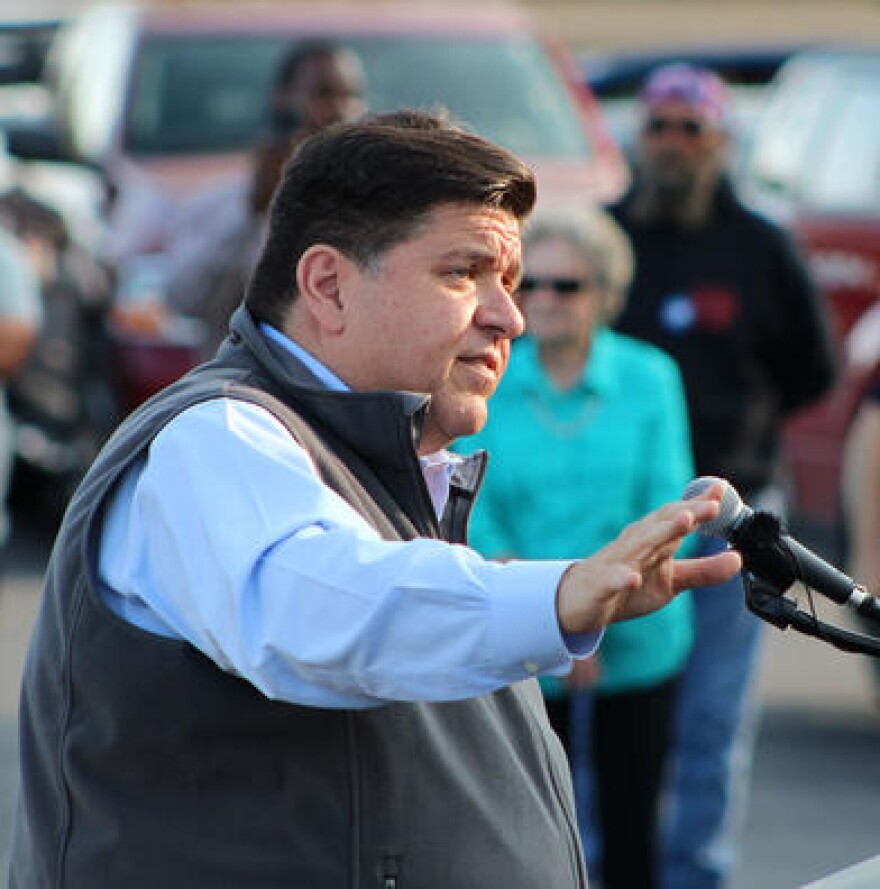After months of declining to endorse any specific plan to both get Illinois on a path to 100% renewable energy and crack down on public utilities’ power in Springfield, Gov. JB Pritzker on Wednesday entered the already raucous fight with his own legislation that will compete with at least three other proposals that have already been introduced.
Pritzker’s plan incorporates some elements of the other already-proposed measures, including ending an energy rate formula lawmakers approved in 2011, championed by utility giants Commonwealth Edison and Ameren. The proposal would also phase out coal by 2030, and end natural gas use by 2045 by reducing caps on greenhouse gas emissions year over year, and implementing an $8 per ton carbon price on emissions from fossil fuel-fired electric plants.
Atop a fact sheet distributed to stakeholders Wednesday and obtained by NPR Illinois, Pritzker’s office said the governor “believes it is past time to combat climate change, hold utility companies accountable to the ratepayers they serve, and rapidly begin the transition to renewable energy.”
While “clean” energy legislation has been atop Pritzker’s wish list since entering office, the issue has taken on new urgency in the last year after ComEd signed off on a $200 million fine and admitted in a deferred prosecution agreement that the company engaged in a years-long bribery scheme attempting to curry favor with longtime former House Speaker Mike Madigan.
“A clean energy future must be an equitable future built by a diverse workforce and good-paying jobs, a future with clean air and water, a future where utility bills no longer burden Illinoisans, and a future where utility companies deliver electricity without corrupt practices,” Pritzker’s fact sheet said. “Illinois can and must lead on clean energy, and it must lead in the light of day — ethically, honestly, and toward the collective goal of empowering Illinoisans to lead the United States in transitioning to a clean energy economy.”
Pritzker's energy proposal would prohibit utility companies from using ratepayer funds for charitable contributions, noting those are “often used to bolster their political power” as ComEd has been noted to donate to politicians’ preferred charities or churches. The plan also would require the Illinois Commerce Commission — the state’s utility regulator — to investigate whether ComEd used ratepayer funds in connection with its deferred prosecution agreement.
Madigan, who has not been charged, was identified as “Public Official A” in that July 17 filing, and was ousted as speaker by members of his own party after 36 years controlling the House in January.
In the fall, high-level lobbyists and consultants for ComEd and company officials with ComEd and Exelon were also indicted, including some of Madigan’s closest allies, like former state representative and longtime lobbyist Mike McClain and lobbyist John Hooker. Pritzker distanced himself from Madigan, and eventually said the speaker either needed to explain his involvement in the scheme or resign.
Ethics and Exelon
The political landscape has changed dramatically since lawmakers geared up the energy fight more than two years ago, with the introduction of progressives’ Clean Energy Jobs Act in early 2019 — just weeks after Pritzker was inaugurated.
With a crowded agenda during the governor’s first legislative session, negotiations on how Illinois could boost its renewable energy portfolio were spiked. But in the months that followed, Chicago news outlets began publishing a steady drip of stories hinting at federal investigators looking into connections between Madigan’s inner circle and ComEd/Exelon.
By September of that year, federal agents staged very public raids at the offices of politicians on the state and local level, and wide-ranging subpoenas revealed that, among other items, they were looking for information related to ComEd and Exelon.
The COVID-19 pandemic threw yet another wrench in plans to negotiate an energy bill, and after Madigan was identified as the nucleus of the ComEd bribery scheme, the former speaker was loathe to give lawmakers a forum to meet and consider his future, let alone legislation.
Though the feds made Exelon a target of its investigation, the company has not shied away from asking Springfield for subsidies to keep two nuclear plants — Byron Generating Station in north central Illinois and Dresden Generating Station in Chicago’s furthest southwest suburbs — open and operating. The request is similar to one Exelon made several years ago when it threatened to shutter its nuclear plants in Clinton and the Quad Cities, which prompted the General Assembly and then-Gov. Bruce Rauner to agree to the Future Energy Jobs Act in late 2016.
Nuclear power is central to a massive energy plan a group of moderate Democrats and a few Republicans introduced last month, dubbed "Climate Jobs Illinois," which has the backing of organized trade labor. But Pritzker earlier this month released a study his office commissioned to determine the level of state support nuclear plants would actually need, which ended up being much smaller than Exelon’s ask. Lawmakers behind the labor-backed plan balked at that finding.
Pritzker’s newly released energy plan would provide “measured, short-term state support” for the Byron and Dresden plants but also require Exelon undergo an annual audit “to ensure any state support for the nuclear fleet is right-sized and offered only when necessary,” according to briefing documents.
If Exelon were to accept state subsidies under Pritzker’s plan, the company would be on the hook for returning that money if it shuttered a nuclear plant “without making a good faith effort to sell the plant first.”
State Rep. Ann Williams (D-Chicago), the lead sponsor of the Clean Energy Jobs Act, says ethics reforms for powerful utility companies must be central to whatever lawmakers end up passing, and maintains that only her legislation has stringent enough language to root out corruption stemming from the companies' relationships with Springfield.
But ComEd this week disagreed with Williams and her allies' proposals that would include a measure of restitution for ratepayers and an outside monitor. The company's senior vice president of regulatory and energy policy, Veronica Gomez, told a House panel Tuesday that it was "not appropriate to make a conclusion here that some additional punishment is due" to ComEd beyond the feds' fine.
Competing plans react
The union-backed Climate Jobs Illinois also introduced ethics language last week after several news outlets published stories on that issue getting pushed to the back burner. After Pritzker's office briefed stakeholders on the governor's plan Wednesday, Climate Jobs Illinois expressed dissatisfaction.
“We’re disappointed that this proposal does not more aggressively advocate for comprehensive labor standards so that new clean energy jobs provide a path to the middle class, especially for communities disproportionately impacted by the pandemic and climate change,” Climate Jobs Illinois Executive Director Joe Duffy said in a statement. “As we review this new language, we’re also concerned that it appears to overlook prioritizing solar on public schools while not doing enough to preserve the nuclear fleet, which is critical to hitting the state’s proposed emissions goals while saving tens of thousands of Illinois jobs.”
The Illinois Clean Jobs Coalition, which backs CEJA, was more conciliatory in its statement after Pritzker formally released his plan Thursday, complimenting the governor on his "bold" idea and saying the group looks forward to negotiating a compromise before lawmakers' spring legislative session ends on May 31.
"While our coalition believes further discussion is needed on many specific provisions of Governor Pritzker’s energy bill, it’s clear this proposal and the Clean Energy Jobs Act (CEJA) share many goals, especially on creating equitable jobs in every part of Illinois, holding utilities accountable, and creating a just transition for places where coal companies have said they will cut and run, leaving communities to deal with property tax shortfalls and loss of good paying jobs if we fail to act," the coalition said in a statement.
A group advocating for solar and wind energy has also been pushing for the last two years to get more state investment in those sectors as subsidies for solar projects ran out much faster than expected. After warning of the so-called "solar cliff" since 2019, the Illinois Power Agency in December said it could no longer give incentives to new solar projects because funding had officially dried up.
Those backing that "Path to 100" have tried to advocate for new subsidies outside of an omnibus energy package given how quickly the subsidies were depleting, but have so far been unsuccessful.
Illinois currently has about a dozen coal-fired power plants still in operation, but the five owned by Texas-based Vistra Energy are set to be retired by 2027 as part of plans the company made after it merged with previous owner Dynegy in 2018. Vistra says it wants to pivot those properties to utility-scale battery projects.
Additionally, Springfield's City Water Light and Power says it plans to shutter its two oldest coal-fired power generators by early 2023, and the Southern Illinois Power Cooperative in Williamson County retired its largest plan last fall.
But NRG Energy, which owns two coal-fired generators in Chicago's north and south suburbs and a third in central Illinois, has no plans to shut down.
But coal remains part of Illinois' energy portfolio, and State Sen. Terri Bryant (R-Murphysboro) said at an unrelated event Wednesday that 50% of southern Illinois' energy is sourced from coal.
"We're not prepared at this time to move away from coal," Bryant said. "We can begin the process of starting these new methods or newer methods, and that's great — I'm happy for that. But the conversation for deep southern Illinois, of course, and probably central Illinois always has to include coal as part of the conversation."
This post has been updated multiple times.






